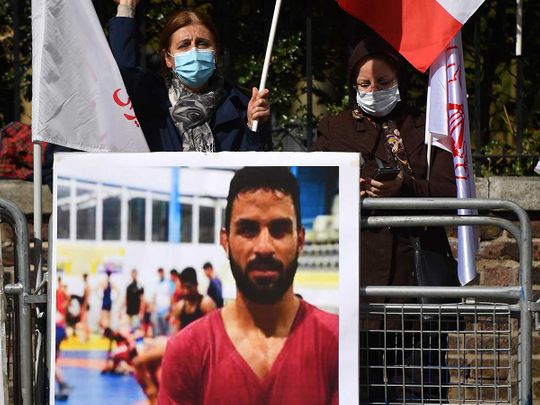
Tehran: Iran said Saturday that it had executed a 27-year-old wrestler accused of murder after he took part in anti-government protests two years ago, a case that set off a campaign by international sports groups to demand clemency for the athlete.
The wrestler, Navid Afkari, was executed Saturday morning at a prison in the southern city of Shiraz, his lawyers confirmed. Afkari was accused of fatally stabbing a water-utility worker amid unrest in Shiraz, a centre of the anti-government protests that swept the country in 2018.
The charges against him had been met with widespread scepticism in Iran and abroad, with many government critics saying he was being used as an example to silence dissent. In an audiotape smuggled from prison, Afkari said he had been tortured until he falsely confessed to the crime.
Afkari’s lawyers said Saturday that Iranian officials had carried out the execution without giving their client a final visit with his family, which they said was dictated by law. Afkari’s family was notified Saturday morning, after the execution.
“How much of a rush were you in to carry out the sentence that you denied Navid one last meeting?” one of the lawyers, Hossein Younesi, posted on Twitter.
Afkari’s legal team had been preparing a last-ditch motion for judicial review of the case.
The International Olympic Committee said it was shocked and saddened by the execution.
“It is deeply upsetting that the pleas of athletes from around the world and all the behind-the-scenes work of the IOC, together with the NOC of Iran, United World Wrestling and the National Iranian Wrestling Federation did not achieve our goal,” the committee said in a statement, referring to Iranian and global sports groups.
Although Afkari had never competed in the Olympics, many had urged the IOC to take action, saying it had an obligation to protect athletes at all levels. The IOC said its president, Thomas Bach, had directly appealed to the country’s supreme leader and president, asking for mercy for Afkari.
The head of the local judiciary, Seyed Kazem Mousavi, told official Iranian news media that the execution was “carried out after due judicial process and at the insistence of the family of the murdered victim.” Under Iranian law, the blood relatives of a victim can forgive a defendant, often after compensation is paid.
Supporters of Afkari had been on a flight to Shiraz to appeal to the family of the slain security guard when the execution took place, his lawyers said.
“Why the rush to execute?” tweeted Mohammad Ali Abtahi, a former vice president who is sometimes critical of the government.
He suggested the judiciary may have sped up the execution in response to the international outcry.
The 2018 protests in Iran had extended from the heartland to the capital, set off by grievances like a weak economy, strict Islamic rules and water shortages. Afkari and two brothers were said to have been among those demonstrating in Shiraz.
Not long after, plainclothes security agents came to the family home and seized Afkari and one of his brothers, their mother, Bahieh Namjoo, said in a recent video posted on social media. The authorities later arrested the other brother, and both brothers have been sentenced to decades in prison.
“They tortured my sons to confess against Navid,” Namjoo said in the video. “There was one sham trial. My children could not defend themselves.”
She pleaded for international help.
Afkari was not well-known before his arrest, even in Iran, although he had won some acclaim around Shiraz. The popularity of wrestling in Iran partly explains his importance to the government, his supporters say, and his value as an example.
Iran executed 251 people last year, more than any country except China, according to Amnesty International.
In one of his last recordings from prison Afkari said that Iranian authorities did not want to hear his appeals.
“They are looking for a neck to hang their rope,” Afkari said.








